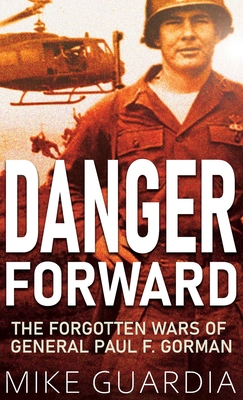Danger Forward: The Forgotten Wars of General Paul F. Gorman

Danger Forward: The Forgotten Wars of General Paul F. Gorman
Combat leadership in action. From Korea to Vietnam...from Panama to the Iron Curtain.
August 27, 1966: The men of 1st Battalion, 26th Infantry were standing strong in the face of enemy fire. For the past thirty-six hours, they had beaten back a relentless wave of enemy assaults. Two days earlier, the Viet Cong had attacked an American patrol along Highway 16 near Bong Trang. The ensuing firefight became so intense that three US infantry battalions were eventually drawn into the melee. History would call it the Battle of Bong Trang.
As the battle raged into its second day, Lieutenant Colonel Paul F. Gorman - the commander of 1st Battalion, 26th Infantry - continued to call for artillery strikes and close air support against the enemy's positions. Despite being badly burned by a misplaced Napalm strike, Gorman maintained his composure and continued calling for fire support until the enemy quit the field. For his audacious leadership and courage under fire, Gorman was awarded the Distinguished Service Cross - the nation's second highest award for valor.
A 1950 West Point graduate, Paul Gorman entered the officer ranks during the inaugural years of the Cold War. Like many of his classmates, Gorman served on the frontlines of Korea. Assigned to the 32d Infantry Regiment, he was decorated for valor in the numerous hilltop battles of 1952. Following the Korean Conflict, he commanded an infantry company in West Germany, where his daily duties revolved around defending NATO from the Red Menace.
Between his two combat tours in Vietnam, Gorman became the principal architect of The Pentagon Papers, and served on the US delegation to the Paris Peace Talks. During the darkest days of the post-Vietnam malaise, Gorman stood at the forefront of revitalizing the US Army's training methods as it transitioned to an all-volunteer force. In his last assignment, Paul Gorman served as Commander-in-Chief of US Southern Command - during the time of Operation Urgent Fury in Grenada and when the US was actively supporting the Contras in Nicaragua. He retired as a four-star General in 1985.
Based on hours of interviews and archival research by author Mike Guardia, this biography of Paul Gorman recounts the life and legacy of a true visionary and forgotten hero of the latter 20th Century.
PRP: 232.04 Lei
Acesta este Prețul Recomandat de Producător. Prețul de vânzare al produsului este afișat mai jos.
208.84Lei
208.84Lei
232.04 LeiLivrare in 2-4 saptamani
Descrierea produsului
Combat leadership in action. From Korea to Vietnam...from Panama to the Iron Curtain.
August 27, 1966: The men of 1st Battalion, 26th Infantry were standing strong in the face of enemy fire. For the past thirty-six hours, they had beaten back a relentless wave of enemy assaults. Two days earlier, the Viet Cong had attacked an American patrol along Highway 16 near Bong Trang. The ensuing firefight became so intense that three US infantry battalions were eventually drawn into the melee. History would call it the Battle of Bong Trang.
As the battle raged into its second day, Lieutenant Colonel Paul F. Gorman - the commander of 1st Battalion, 26th Infantry - continued to call for artillery strikes and close air support against the enemy's positions. Despite being badly burned by a misplaced Napalm strike, Gorman maintained his composure and continued calling for fire support until the enemy quit the field. For his audacious leadership and courage under fire, Gorman was awarded the Distinguished Service Cross - the nation's second highest award for valor.
A 1950 West Point graduate, Paul Gorman entered the officer ranks during the inaugural years of the Cold War. Like many of his classmates, Gorman served on the frontlines of Korea. Assigned to the 32d Infantry Regiment, he was decorated for valor in the numerous hilltop battles of 1952. Following the Korean Conflict, he commanded an infantry company in West Germany, where his daily duties revolved around defending NATO from the Red Menace.
Between his two combat tours in Vietnam, Gorman became the principal architect of The Pentagon Papers, and served on the US delegation to the Paris Peace Talks. During the darkest days of the post-Vietnam malaise, Gorman stood at the forefront of revitalizing the US Army's training methods as it transitioned to an all-volunteer force. In his last assignment, Paul Gorman served as Commander-in-Chief of US Southern Command - during the time of Operation Urgent Fury in Grenada and when the US was actively supporting the Contras in Nicaragua. He retired as a four-star General in 1985.
Based on hours of interviews and archival research by author Mike Guardia, this biography of Paul Gorman recounts the life and legacy of a true visionary and forgotten hero of the latter 20th Century.
Detaliile produsului













